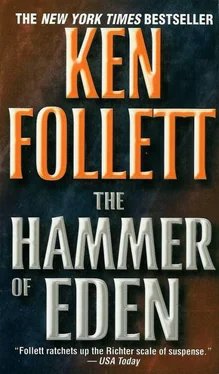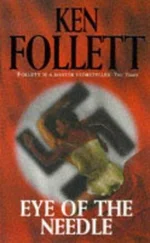But Priest had to take the risk. He was desperate. He had promised an earthquake four days from now, and he had to carry out his threat. Otherwise all was lost.
Bones agreed readily to the plan. Priest had half expected him to demand payment. However, he had been living free at the commune for four days, so it was too late for him to put his relationship with Priest on a commercial footing. Besides, as a communard Bones knew that the greatest imaginable sin was to value things in money terms.
Bones would be more subtle. In a day or two he would ask Priest for cash to go score some smack. Priest would cross that bridge when he came to it.
“Let’s get to it,” he said.
Oaktree and Star climbed into the cab of the carnival ride with Bones. Melanie and Priest took the ’Cuda for the mile-long ride to where the seismic vibrator was hidden.
Priest wondered what else the FBI knew. They had figured out that the earthquake had been triggered using a seismic vibrator. Had they progressed any further? He turned on the car radio, hoping for a bulletin. He got Connie Francis singing “Breakin’ in a Brand New Broken Heart,” an oldie even by his standards.
The ’Cuda bumped along the muddy track through the forest behind Bones’s truck. Bones handled the big rig confidently, Priest observed, even though he had only just been roused from a drunken sleep. There was a moment when Priest felt sure the carnival ride was going to get stuck in a mudslide, but it pulled through without stopping.
The news came on just as they drew near the hiding place of the seismic vibrator. Priest turned up the volume.
What he heard turned him pale with shock.
“Federal agents investigating the Hammer of Eden terrorist group have issued a photographic likeness of a suspect,” the newsreader said. “He has been named as Richard or Ricky Granger, aged forty-eight, formerly of Los Angeles.”
Priest said: “Jesus Christ!” and slammed on the brakes.
“Granger is also wanted for a murder in Shiloh, Texas, nine days ago.”
“What?” No one knew he had killed Mario, not even Star.
The Rice Eaters were desperately keen to cause an earthquake that might kill hundreds, but all the same they would be appalled to know he had battered a man to death with a wrench. People were inconsistent.
“That’s not true,” Priest said to Melanie. “I didn’t kill anyone.”
Melanie was staring at him. “Is that your real name?” she said. “Ricky Granger?”
He had forgotten that she did not know. “Yeah,” he said. He racked his brains to think who knew his real name. He had not used it for twenty-five years, except in Shiloh. Suddenly he remembered that he had gone to the sheriff’s office in Silver City, to get Flower out of jail, and his heart stopped for a moment; then he recalled that the deputy had assumed he had the same name as Star and called him Mr. Higgins. Thank God.
Melanie said: “How did they get a photo of you?”
“Not a photo,” he said. “A photographic likeness . That must mean one of those Identikit pictures that they make up.”
“I know what you mean,” she said. “Only they use a computer program now.”
“There’s a computer program for every goddamn thing,” Priest muttered. He was now very glad he had changed his appearance before taking the job in Shiloh. It had been worth the time it took to grow a beard, the bother of pinning up his hair every day, and the nuisance of having to wear a hat all the time. With luck, the photographic likeness would not remotely resemble the way he looked now.
But he needed to be sure.
“I need to get to a TV,” he said.
He jumped out of the car. The carnival ride had pulled over near the hiding place of the seismic vibrator, and Oaktree and Star were getting out. In a few words he explained the situation to them. “You make a start here while I drive into Silver City,” he said. “I’ll take Melanie — I want her opinion, too.”
He got back in the car, drove out of the woods, and headed for Silver City.
On the outskirts of the small town there was an electronics store. Priest parked and they got out.
Priest looked around nervously. It was still light. What if he should meet someone who had seen his face on TV? Everything hung on whether the picture was like him. He had to know. He had to take a chance. He approached the store.
The window displayed several TV sets all showing the same picture. The program was some kind of game show. A silver-haired host in a powder blue suit was joshing a middle-aged woman wearing too much eyeliner.
Priest glanced up and down the sidewalk. There was no one else about. He looked at his watch: almost seven. The news would be on in a few seconds.
The silver-haired host put his arm around the woman and spoke to the camera. There was a shot of an audience applauding with hysterical enthusiasm. Then the news came on. There were two anchors, a man and a woman. They spoke for a few seconds.
Then the multiple screens showed a black-and-white picture of a heavily bearded man in a cowboy hat.
Priest stared at it.
The picture did not look like him at all.
“What do you think?” he said.
“Even I wouldn’t know it was supposed to be you,” Melanie said.
Relief washed over him in a tidal wave. His disguise had worked. The beard changed the shape of his face, and the hat hid his most distinctive feature, the long, thick, wavy hair. Even he might not have recognized the picture if he had not known it was supposed to be him.
He relaxed. “Thank you, god of the hippies,” he said.
The screens all flickered, and another picture appeared. Priest was shocked to see, reproduced a dozen times, a police photo of himself at nineteen. He was so thin, his face looked like a skull. He was trim now, but in those days, doping and drinking and never eating a regular meal, he had been a skeleton. His face was drawn, his expression sullen. His hair was lank and dull, with a Beatles haircut that must have been out of date even then.
Priest said: “Would you recognize me?”
“Yes,” she said. “By the nose.”
He looked again. She was right; the picture showed his distinctive narrow nose, like a curved knife.
Melanie added: “But I don’t think anyone else would know you, certainly not strangers.”
“That’s what I thought.”
She put an arm around his waist and squeezed affectionately. “You looked like such a bad boy when you were young.”
“I guess I was.”
“Where did they get that picture, anyway?”
“From my police record, I’m assuming.”
She looked up at him. “I didn’t know you had a police record. What did you do?”
“You want a list?”
She seemed shocked and disapproving. Don’t get moral on me, baby — remember who told us how to cause an earthquake . “I gave up the life of crime when I came to the valley,” he said. “I didn’t do anything wrong for the next twenty-five years — until I met you.”
A frown wrinkled her brow. She did not think of herself as a criminal, he realized. In her own eyes she was a normally respectable citizen who had been driven to commit a desperate act. She still believed she was of a different race from people who robbed and murdered.
Work it out any way you like, honey — just stay with the plan .
The two anchors reappeared, then the scene shifted to a skyscraper. A line of words appeared at the bottom of the screen. Priest did not need to be able to read them: he recognized the place. It was the Federal Building, where the FBI had its San Francisco office. A demonstration was going on, and Priest recalled Melanie reading about it in the newspaper. They were demonstrating in support of the Hammer of Eden, she had said. A bunch of people with placards and bullhorns were haranguing a group entering the building.
Читать дальше












